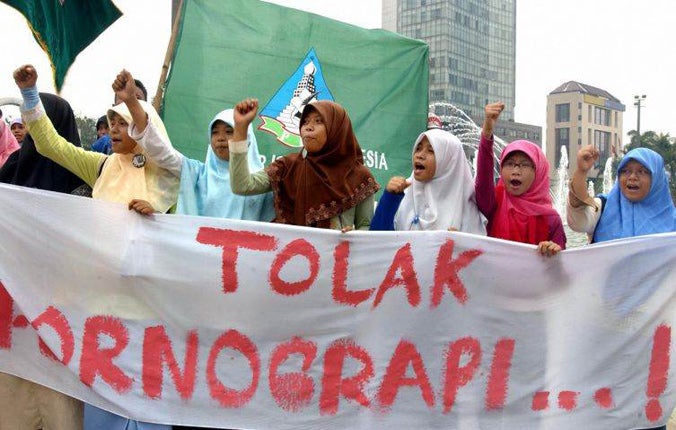The dancers facing a long stretch – in jail
Indonesia's 'anti-pornography' law could make traditional culture a crime, reports Aubrey Belford in Jakarta

The show at the Belair Cafe & Music Lounge – semi-naked women gyrating before tipsy revellers – was relatively tame by the standards of Indonesia's decadent clubland. Authorities in the world's largest Muslim nation have long turned a blind eye to what goes on behind closed doors in dugem, the "glittering world" of bars and clubs.
So why police raided the bar in the leafy city of Bandung and arrested four dancers, the club manager and the event organiser is something that still bemuses owner Ediwarna Widjaja a month later. In the same complex as the Belair, several "spa and karaoke" establishments have been left untouched, despite being known for offering sexual services.
The six people arrested at Mr Widjaja's club will be the first to be tried under a harsh 2008 "anti-pornography" law. The dancers could be jailed for up to 10 years, their handlers for 15.
The move to apply the law, which was backed by President Susilo Bambang Yudhoyono at the urging of Islamist parties, is being seen as a sign that Islamic conservatives are gaining ground in a campaign to erode Indonesia's tradition of religious tolerance. Mr Widjaja, a middle-aged ethnic Chinese businessman, giggles nervously when asked if the raid was politically motivated. "I don't dare say that," he says.
Ellin Rozana, the director of local women's rights group Institut Perempuan, believes the raid in Bandung may prove to be the opening salvo in a local Islamist-driven morality crackdown.
"Since the early 2000s there have been laws emerging in the regions with the spirit of discriminating against women in the name of religion, but the anti-pornography law is making this easier," Ms Rozana said. "The anti-pornography law can't be separated from efforts to formalise sharia law."
The law is, on paper, remarkably powerful. It defines pornography as any form of expression, including "bodily movements", deemed to "violate community morality". The law was vigorously opposed by secularists and the religious minorities that make up 10 per cent of Indonesia's 234 million citizens. After it was passed, there were hopes it would, like many laws, be rendered a dead letter by the unwieldy and corrupt system of law enforcement.
But in Bandung, authorities admit they want to clean up the city. The local police chief, Ferdi Ligaswara, says the raid was in line with a campaign by the Muslim Mayor to create a "religious city", but not to introduce sharia.
The broader fear is that the law will be used to pick away at the country's complex mix of traditions and religions. Although the law protects traditional cultures, critics say its broad definition of pornography potentially labels much of the culture from places like Hindu Bali or Christian and animist Papua as illegal smut.
Even in the province of West Java, where Bandung is situated, the law is seen by some as a weapon against folk culture that draws on a long, pre-Islamic history. Among those alarmed is Mas Nanu Muda, a practitioner of the Jaipongan dance, which is known for the sensual hip movements of its (clothed) female performers. "The dancing at the Belair was outside of tradition, but even so [the crackdown] is going to impact on other things like Jaipongan," he said.
Subscribe to Independent Premium to bookmark this article
Want to bookmark your favourite articles and stories to read or reference later? Start your Independent Premium subscription today.

Join our commenting forum
Join thought-provoking conversations, follow other Independent readers and see their replies